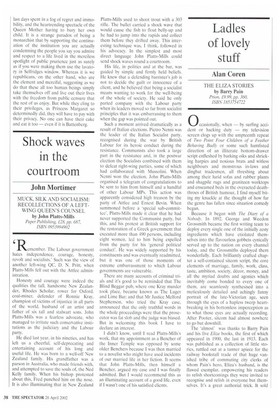Shock waves in the courtroom
John Mortimer
MUCK, SILK AND SOCIALISM: RECOLLECTIONS OF A LEFTWING QUEEN'S COUNSEL by John Plaits-Mills Paper Publishing, 128, pp. 687, ISBN 0953994902 Remember. The Labour government hates independence, courage, honesty, revolt and socialists.' Such was the view of another left-wing QC, D. N. Prim when Platts-Mills fell out with the Attlee administration.
Honesty and courage were indeed the qualities the tall, handsome New Zealander, Rhodes Scholar, rower for Oxford, coal-miner, defender of Ronnie Kray, champion of victims of injustice in all parts of the world, husband of an artist and father of six tall and stalwart sons. John Platts-Mills was a fearless advocate, who managed to irritate such conservative institutions as the judiciary and the Labour party.
He died last year, in his nineties, and has left us a cheerful, self-deprecating and entertaining account of his long and useful life. He was born to a well-off New Zealand family. His grandfather was a parson in Australia, who made friends with, and attempted to save the souls of, the Ned Kelly family. When his bishop protested about this, Fred punched him on the nose. It is also illuminating that in New Zealand Platts-Mills used to shoot trout with a 303 rifle. The bullet carried a shock wave that would cause the fish to float belly-up and he had to jump into the rapids and collect them before they drifted away. This interesting technique was, I think, followed in his advocacy. In the simplest and most direct language John Platts-Mills could send shock waves round a courtroom.
His life, in politics and at the bar, was guided by simple and firmly held beliefs. He knew that a defending barrister's job is not to decide the guilt or innocence of a client, and he believed that being a socialist means wanting to work for the well-being of the whole of society. He said he only parted company with the Labour party when its leaders moved so far from socialist principles that it was embarrassing to them when the gap was pointed out.
Such a moment arrived dramatically as a result of Italian elections. Pietro Nenni was the leader of the Italian Socialist party, recognised during the war by British Labour for its heroic conduct during the resistance. Communists also took a large part in the resistance and, in the postwar election the Socialists combined with them to defeat right-wing parties, some of which had collaborated with Mussolini. When Nenni won the election, John Platts-Mills organised a telegram of congratulations to be sent to him from himself and a handful of other Labour MPs. This action was apparently considered high treason by the party of Attlee and Ernest Bevin. When summoned before a 'special sub-committee, Platts-Mills made it clear that he had never supported the Communist party. but this, and his protest at British support for the restoration of a Greek government that executed more than 490 persons, including eight women, led to him being expelled from the party for his 'general political conduct'. He was widely supported by his constituents and was eventually readmitted, but it was one of those moments of extreme embarrassment to which Labour governments are vulnerable.
There are many accounts of criminal trials and it's good to be reminded that The Blind Beggar pub, where one Kray murder took place, became known as The Luger and Lime Bar; and that Mr Justice Melford Stephenson, who tried the Kray case, announced that the only truthful words in the whole proceedings were that the prosecutor was fat slob and the judge was biased. But in welcoming this book I have to declare an interest.
I didn't know, until I read Platts-Mills's work, that my appointment as a Bencher of the Inner Temple was opposed by some older Benchers because I was then married to a novelist who might have used incidents of our married life in her fiction. It seems that John Platts-Mills, then himself a Bencher, argued my case and I was finally admitted. But I would recommend this as an illuminating account of a good life, even if I wasn't one of his satisfied clients.






































































 Previous page
Previous page